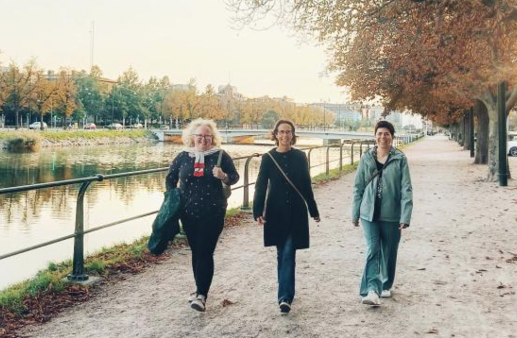GRIN Meeting 2022
6 October 2022
-by Kerry Hood, Becky Cannings-John & Dave Gillespie
We dusted off our passport to go to what was for many of us our first face to face international conference in three years. The words ‘international conference’ can imply something cold and business like, but GRIN meetings are more like a large family gathering – with plenty of singing. Formed by a collaboration between different departments of primary care across Europe as an informal annual meeting where active researchers on infections in primary care came together to discuss what they had been doing and hatch plans for future research. Whilst it has grown to about 100 people at this meeting and has been an integral part of many Europe wide research programs, it retains the feeling of a family, sharing challenges and enthusiasm with very little in the way of egos or scent marking.
From their website: “GRIN (General practice Research on Infections Network, formerly General practice Respiratory Infections Network) is a European network of researchers studying respiratory tract and other infections in primary care.”
Having had a global pandemic since we last met had not only delayed our meeting, but also fed into our research, with two sessions exploring COVID-19 and of particular interest was a number of studies which had compared the post COVID syndrome (or Long COVID) to other lower respiratory tract infections. Then we moved into sessions on the management of respiratory infections, antimicrobial stewardship and urinary tract infections. There were a number of talks around optimising antibiotic treatment durations for common infections – with interest in both fixed duration comparisons and the merits of “completing the course” versus “stopping when you feel better”. This is a clear area where further research is needed and it was interesting to join in on discussions around this.
What really impressed us was the number of studies that even if they were run in only one country had researchers from multiple countries involved were very high, as well as a number of offers of making data available if people wanted to do further analysis.
We had a very good showing of research from Cardiff, with presentations from the Centre for Trials Research, the Division of Population Medicine and the School of Pharmacy – representing just how multidisciplinary we are as a group. We were the envy of many with having the SAIL databank in Wales which provided data for many of our projects. The most novel use of which linked registration data for domiciliary care workers to health records to look at the impact of COVID on their health. Another key strength of SAIL is the use of the newly acquired microbiology datasets and by linking it to primary care records will allow us to shine light on the relationship between the antibiotic dispensing behaviour of clinicians and resistance, another topic of interest at the conference.


As is always the case the meeting finished with our brains buzzing with new ideas and we felt reinvigorated. Kerry took a sight seeing walk with the research team from the University of Antwerp which was a chance to kick back a little and relax – as always come away with some non-work reading suggestions, broadening her mind and horizons in more ways than just for work.
- December 2025
- October 2025
- June 2025
- May 2025
- April 2025
- March 2025
- February 2025
- December 2024
- November 2024
- October 2024
- September 2024
- July 2024
- June 2024
- May 2024
- April 2024
- March 2024
- December 2023
- November 2023
- September 2023
- July 2023
- June 2023
- April 2023
- March 2023
- February 2023
- December 2022
- November 2022
- October 2022
- September 2022
- August 2022
- July 2022
- June 2022
- May 2022
- April 2022
- March 2022
- February 2022
- January 2022
- November 2021
- September 2021
- July 2021
- June 2021
- May 2021
- March 2021
- February 2021
- December 2020
- November 2020
- September 2020
- August 2020
- July 2020
- January 2020
- December 2019
- October 2019
- September 2019
- July 2019
- June 2019
- May 2019
- April 2019
- February 2019
- December 2018
- November 2018
- October 2018
- September 2018
- August 2018
- July 2018
- June 2018
- May 2018
- April 2018
- March 2018
- December 2017
- October 2017
- August 2017
- July 2017
- June 2017
- May 2017
- April 2017
- March 2017
- February 2017
- January 2017
- December 2016
- October 2016
- August 2016
- June 2016
- April 2016
- March 2016
- February 2016